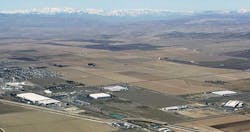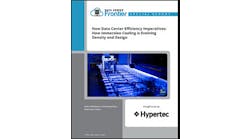If you’re looking to operate a large data center and keep costs low, there are few places more attractive than Quincy, Washington. That’s why the tiny farming town in central Washington is home to a cluster of data centers, including several cloud campuses operated by Microsoft.
Quincy is not for everyone, however. Several single-tenant facilities have thrived in Quincy, but multi-tenant service providers have a more mixed track record.
But interest in Quincy is clearly on the rise, with several new players entering the market. CyrusOne has acquired 45 acres of land near the Microsoft campus, and is offering designs for build-to-suit projects for hyperscale clients.
Meanwhile, H5 Data Centers has entered the market with the acquisition of a former Intuit Corp. data center, where H5 will offer wholesale space.
Cheap, Renewable Power
Central Washington is notable for its ample supply of cheap, green hydro power served by the Columbia River Basin, which in some cases is available for less than 3 cents per kilowatt hour, one of the cheapest rates available in the United States. The area is also ideal for the use of fresh air in data center cooling systems, which allows facilities to operate without energy-hungry chillers.
Quincy, a rural town of 7,200 residents, is home to data centers for seven different companies, spanning about 2.5 million square feet of space, including cutting-edge facilities operated by Microsoft and Yahoo, which operate with Power Usage Efficiency (PUE) ratings around 1.1. Quincy also has two wholesale data center operators, Vantage and Sabey. Vantage has leased its entire facility to a single enterprise users, while Sabey has experienced success with a multi-tenant approach, and recently announced plans to expand its footprint in Quincy.
But others have struggled or retrenched in Quincy. In 2011, Dell announced a new data center build in Quincy, which was part of its plans to sell cloud computing services to compete with Amazon Web Services. The company abandoned its cloud plans in 2013, and had difficulty finding customers for its Quincy site, which was eventually acquired by NTT Data in early 2017. Intuit has also scaled back its operations in Quincy (more on that in a moment).
Development in Quincy got a boost in 2015 when the state of Washington extended incentives that exempted data centers from sales and use taxes on servers and power infrastructure. Shortly afterward, both Sabey and Yahoo commenced major expansions of their campuses in Quincy. Over the past several years, Microsoft has dramatically expanded its presence in Quincy, building at least four new data center buildings optimized for its Generation 5 design.
For CyrusOne, Quincy Means Economic Efficiency
Kevin Timmons has been a key player in the development of the Quincy data center cluster. He was part of the Yahoo team that built the company’s first data center in Quincy in 2007, and returned in 2011 as GM of Datacenter Services for Microsoft, which built the second phase of its Quincy development using a lightweight design that Timmons compared to a “modular tractor shed” filled with servers.
As the Chief Technology Officer at CyrusOne, Timmons is once again looking to deploy a new design in Quincy. CyrusOne has emerged as a leading player in the hyperscale data center sector, as the company’s ability to build data centers fast has helped it win a series of major deals with cloud providers. CyrusOne’s focus on lean construction and pre-fabricated components allows it to deliver new data centers in six to nine months, and deploy new capacity at a cost of about $6 million per megawatt.
Timmons believes Quincy is the perfect site to join that design efficiency with cheap power and a cool climate.
“Our goal for our Quincy campus is to be the most economic data center to operate in the United States, from an expense perspective,” said Timmons. “It would be the lowest cost electricity, paired with the most efficient design.”
A diagram of one of CyrusOne’s floorplans for its new campus in Quincy, Washington. (Image: CyrusOne)
CyrusOne is marketing its Quincy site as a build-to-suit opportunity, and Timmons says CyrusOne has developed several designs to suit the goals of different clients. These include:
- The Cloud Center a hyperscale data center supporting up to 45 megawatts of data center capacity in a single structure. CyrusOne said its data center building can be as large as 930,000 square feet, with 720,000 square feet of colocation space.
- The Eco-Center is a design optimized for superior energy efficiency, featuring lovers in the building exterior to support the use of fresh air in cooling systems. The goal is to create an “ultra-low PUE” facility, Timmons said, with the ability operate at expanded ranges of temperature and humidity.
“We have a lot of flexibility on that campus to mix Cloud Centers and Eco-Centers,” said Timmons. “I think our prospects are customers that are starting to look at their data center spend differently. They understand the life-cycle costs of data centers, and that where you put them matters, since that they’re hard to move. We’ve got customers and potential customers that do a good job measuring TCO (total cost of ownership).”
H5 Data Centers Sees Opportunity With Intuit Deal
H5 Data Centers is privately held, and operates facilities in Phoenix, Denver, Atlanta, Charlotte, Seattle, San Jose and San Luis Obispo in California. The company is focused on wholesale data center real estate, with about half of its portfolio is fully leased to single tenants.
For H5, the Quincy acquisition builds upon its presence in the Pacific Northwest, where it operates a large facility in downtown Seattle, where it redeveloped the former Seattle Times building as a telecommunications hub.
The Quincy facility is a 240,000 square foot building sitting on a 64-acre site, offering expansion capacity for additional buildings. The data center was originally built by Intuit Corp., which has decided to move most of its IT operations to the cloud. Intuit, which will continue as a tenant of H5 in the building, expects to record a loss of $75 to $85 million on the sale of the facility.
“We chose to move to Amazon Web Services (AWS) to accelerate developer productivity and innovation for our customers, and to accommodate spikes in customer usage through the tax season,” said H. Tayloe Stansbury, Intuit Executive Vice President and Chief Technology Officer. “Our TurboTax Online customers were served entirely from AWS during the latter part of this tax season, and we expect to finish transitioning QuickBooks Online this year.
“Now that most of our core applications are in AWS, the time is right to transition the ownership and operation of this data center to a team who will expertly manage the infrastructure through the remainder of this transition,” Stansbury added.
An exterior view of the former Intuit data center that has been acquired by H5 Data Centers. (Photo: H5 Data Centers)
H5, which has been opportunistic in buying up data center assets, sees the Quincy market as an opportunity.
“H5 Data Centers is experiencing strong demand for wholesale data center services across the United States and the Quincy data center represents an incredible growth opportunity for us,” said Josh Simms, founder and CEO of H5 Data Centers. “We welcome a world-class team of data center professionals to our company as we look to immediately expand the critical capacity of the data center to serve the mission-critical needs of leading global enterprises.”
The facility will provide more than 40 megawatts of turn-key wholesale colocation space at full build-out, and can support high-density deployments of up to 500 watts per square foot, H5 said. Power costs are expected to be approximately 3 cents per kilowatt hour for renewable hydro power. Tenants will be eligible for a 100 percent state sales and use tax abatement on data center equipment.
The acquisition expands H5 Data Centers’ national portfolio to 12 data centers and compliments its 300,000 square-foot data center in downtown Seattle. Quincy, Washington is one of the country’s largest wholesale data center markets because of its access to low-cost, renewable energy, Washington-state sales tax incentives, and reduced exposure to natural disaster risks.






